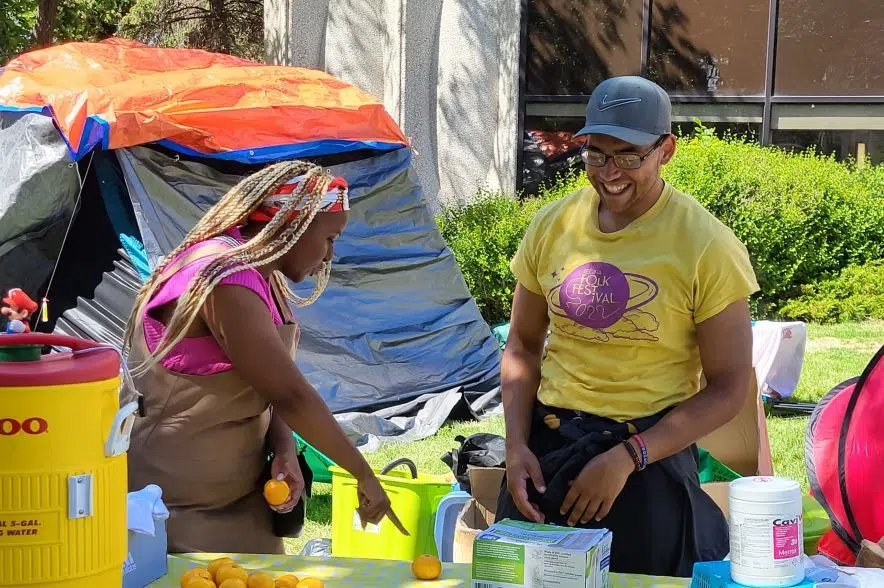As homelessness persists in Regina, some residents have gathered quite literally outside the halls of power.
On Monday afternoon, passersby, volunteers and people in need gathered outside City Hall. Volunteers had set up a table where people could get food and other supplies.
The makeshift arrangement was originally located at Pepsi Park on Thursday, when hundreds of people were given free meals.
As the night wound down, volunteer Mandla Mthembu said the group was told to leave by police.
“We picked up the tent — we actually didn’t take it all the way down — and we just marched it from Pepsi Park and we were like, ‘Well, let’s just go downtown,’ and someone was like, ‘Let’s go to City Hall. Yeah, let’s go to City Hall,’ ” Mthembu said.
“We got to City Hall, set it up and we weren’t really sure what to do. We’re kind of just sitting there hoping that maybe we’d (find) some people in need and luckily some people from the community came and said, ‘We like what you’re doing.’ ”
They’ve been serving meals outside of City Hall ever since.
Based on some of the feedback he received, Mthembu said having the setup near City Hall serves as a great way to keep the issue of homelessness in the public eye.
Mthembu said the group doesn’t necessarily have a cohesive political agenda, but he and many other volunteers are calling on the city to take serious action when it comes to ending homelessness.
“I think if you look around the city and talk to people around the streets, it’s gotten worse,” Mthembu said.
He mentioned supporting a housing-first model as well as providing people with wrap-around supports for mental and physical health.
Darlene Shepherd, 68, has lived in Regina almost her entire life. She’s been homeless off and on for a number of years and didn’t have a home through the winter.
For her, the setup at City Hall has provided her with a great deal of relief.
“Going day by day, my feet hurt so much from walking, I just need to rest and we can’t even rest anywhere,” Shepherd said. “People are telling us, ‘Go, go, go. Get out of here, this is private property.’ ”
Shepherd got emotional as she described the psychological toll of living without a home.
“People around here don’t understand,” she said. “You see us. How can you not know that there needs to be help?”
Joe Meays is another person who knows what it’s like to be homeless. He has a home right now, but he showed up at City Hall in support of the gathering.
“You’ve got people with serious disabilities and intellectual and physical disabilities, addictions and mental health issues and they’re dying on the street,” Meays said. “They’re my family, they’re my friends and I’m tired of watching this.”
Meays said Regina’’s homelessness problem has only gotten worse in his lifetime.
“Treating people as less than human isn’t going to solve this problem,” Meays said.
In addition to streamlining communication between the federal and provincial governments to end homelessness, he also wants to see the city collaborate more with community groups.
“With the amount of vacant apartments and houses in this city, there’s no excuse for this at all,” Meays said.
Encampment at City Hall not the solution: Bray
Regina Police Service Chief Evan Bray said creating a tent city on the front lawn of City Hall is not a solution, given that homelessness is more of a provincial priority than a municipal one.
“Setting up a camp in front of City Hall is, in my opinion, a publicity stunt by people that go to their comfy beds at the end of the night and are exploiting those that really need the help,” Bray said on Tuesday’s Greg Morgan Morning Show.
Bray said housing is available, but many of those facilities have zero tolerance for drugs and alcohol. While not all homeless people struggle with substance problems or addictions, Bray agrees there needs to be supportive housing available for people trying to overcome addictions issues.
However, he does not think pitching tents in front of City Hall is a viable option for addressing the issue.
“My frustration is that it’s often activists that, in my view, are exploiting people that are homeless that are trying to use this as a grandstand to make some sort of political point,” Bray said.
Bray will retire at the end of June, but said something he has always advocated for during provincial meetings are secure facilities that can help people who do not want help with their addictions.
“If you say, ‘Here’s a place where you can stay, but you need to be drug- and alcohol-free,’ and they say, ‘Sorry, I am not willing to play by those rules,’ then you are basically not giving them another alternative unless we have some sort of facility where we can basically compel them to get the help they need,” he said.
— With files from 980 CJME’s Gillian Massie










